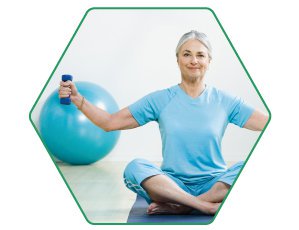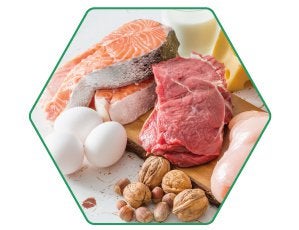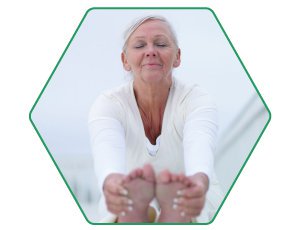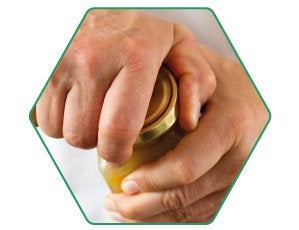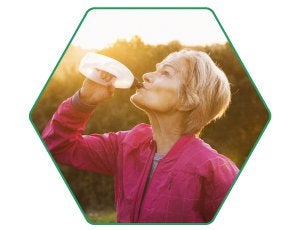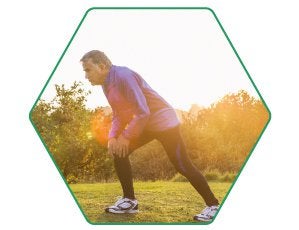Protein & its role in healthy living
What are proteins?
After water our body is mostly composed of proteins. Indeed, proteins are the main component of cells and are essential to life. Proteins are often called “the building blocks of life”.
Proteins have complex structures: they are made up of many smaller units called amino acids. These are linked together in a chemical bond forming a long chain. Some of these amino acids are called ‘essential,’ meaning they are crucial for life but cannot be produced by the human body and must be gained through one’s diet.
There are many different types of proteins in the body. For example:
- Muscle mass is made of protein
- Collagen which provides strength and structure to tissues (e.g. cartilage)
- Skin, hair and nails which are mainly composed of proteins
- Hemoglobin which transports oxygen around the body
- Most hormones which act as your body’s chemical messengers are also proteins
- Enzymes which regulate all aspects of metabolism; they support important chemical reactions that allow you to digest food, generate energy to contract muscles, and regulate insulin production
- Antibodies which play a role in your immune response
Protein in the diet
Proteins are a type of macronutrient, which, along with carbohydrates and lipids, are needed by the body to function normally. Protein generally makes up 10% to 15% of the body’s energy needs. Our body is not able to store amino acids in the same way it can carbohydrates and fats, so we need a daily intake of amino acids through protein in our diets to make new protein. Sources of Protein should be consumed evenly across the day and be part of each meal.
Protein can be found in:
- Animal sources, such as meat, fish, eggs and dairy products. These contain the full range of essential amino acids
- Grains, fruits, vegetables and nuts
How much protein per day does the over 50s need?
- The recommended Reference Nutrient Intake (RNI) for adults is 0.83 g of protein per kilogram bodyweight per day[1].
- Several nutrition experts have recommended that men and women in their 50s should increase their protein intake compared to younger adults[2]. An intake of 1.0 g to 1.2 g of protein per kilogram of body weight per day is recommended for the 50+[3](5) This means:
- A 50+ year old man weighing 80 kilograms should consume 80 to 96 grams of protein per day (which corresponds to 280-340 g of chicken breast per day).
- A 50+ year old woman weighing 60 kilograms should consume 60 to 72 grams of protein per day (corresponding to 210-250 g of chicken breast).
Additional sources support health benefits of protein for the 50+
- The scientific community and health authorities such as the European Food Safety Authority (EFSA) agree that protein from diet has a beneficial effect on the whole lean body mass, including muscle mass[4].
- The European Food Safety authority also states that protein is essential for the growth and maintenance of bones.
Adults over 50 should seek to get enough protein through a healthy and balanced diet, and/or with the support of high quality nutritional supplements.
To learn more, read about The Allies for Healthy Aging.
[1] Houston, D.K. et al. Dietary protein intake is associated with lean mass change in older, community dwelling adults: the Health, Aging, and Body Composition (Health ABC) Study. Am J Clin Nutr 87, 150-155 (2008).
[2] Bauer J, et al. Evidence-based recommendations for optimal dietary protein intake in older people: a position paper from the PROT-AGE Study Group. J Am Med Dir Assoc. 2013;14(8):542-59.
Mithal A, et al. Impact of nutrition on muscle mass, strength, and performance in older adults. Osteoporos Int. 2013;24(5):1555-66.
Deutz NE, et al. Protein intake and exercise for optimal muscle function with aging: Recommendations from the ESPEN Expert Group. Clin Nutr. 2014.
[3] Rizzoli, R. et al. The role of dietary protein and vitamin D in maintaining musculoskeletal health in postmenopausal women: A consensus statement from the European Society for Clinical and Economic Aspects of Osteoporosis and Osteoarthritis (ESCEO).
[4] European Food Safety Authority (EFSA) in a scientific opinion in 2010: “Scientific Opinion on the substantiation of health claims related to protein and increase in satiety leading to a reduction in energy intake (ID 414, 616, 730), contribution to the maintenance or achievement of a normal body weight (ID 414, 616, 730), maintenance of normal bone (ID 416) and growth or maintenance of muscle mass (ID 415, 417, 593, 594, 595, 715) pursuant to Article 13(1) of Regulation (EC) No 1924/2006”https://www.efsa.europa.eu/en/efsajournal/pub/1811
[5] EFSA Journal 2011; 9(4):2075. Scientific Opinion on the substantiation of health claims related to water and maintenance of normal physical and cognitive functions (ID 1102, 1209, 1294, 1331), maintenance of normal thermoregulation (ID 1208) and “basic requirement of all living things” (ID 1207) pursuant to Article 13(1) of Regulation (EC) No 1924/20061
[6] Centres for Disease control and prevention CDC. Physical Activity and Health: A Report of the Surgeon General. Older Adults. http://www.cdc.gov/nccdphp/sgr/olderad.html

